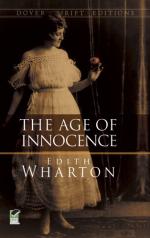They began, obliquely, by talking about Mrs. Lemuel Struthers.
“It’s a pity the Beauforts asked her,” Mrs. Archer said gently. “But then Regina always does what he tells her; and Beaufort—”
“Certain nuances escape Beaufort,” said Mr. Jackson, cautiously inspecting the broiled shad, and wondering for the thousandth time why Mrs. Archer’s cook always burnt the roe to a cinder. (Newland, who had long shared his wonder, could always detect it in the older man’s expression of melancholy disapproval.)
“Oh, necessarily; Beaufort is a vulgar man,” said Mrs. Archer. “My grandfather Newland always used to say to my mother: `Whatever you do, don’t let that fellow Beaufort be introduced to the girls.’ But at least he’s had the advantage of associating with gentlemen; in England too, they say. It’s all very mysterious—” She glanced at Janey and paused. She and Janey knew every fold of the Beaufort mystery, but in public Mrs. Archer continued to assume that the subject was not one for the unmarried.
“But this Mrs. Struthers,” Mrs. Archer continued; “what did you say she was, Sillerton?”
“Out of a mine: or rather out of the saloon at the head of the pit. Then with Living Wax-Works, touring New England. After the police broke that up, they say she lived—” Mr. Jackson in his turn glanced at Janey, whose eyes began to bulge from under her prominent lids. There were still hiatuses for her in Mrs. Struthers’s past.
“Then,” Mr. Jackson continued (and Archer saw he was wondering why no one had told the butler never to slice cucumbers with a steel knife), “then Lemuel Struthers came along. They say his advertiser used the girl’s head for the shoe-polish posters; her hair’s intensely black, you know—the Egyptian style. Anyhow, he— eventually—married her.” There were volumes of innuendo in the way the “eventually” was spaced, and each syllable given its due stress.
“Oh, well—at the pass we’ve come to nowadays, it doesn’t matter,” said Mrs. Archer indifferently. The ladies were not really interested in Mrs. Struthers just then; the subject of Ellen Olenska was too fresh and too absorbing to them. Indeed, Mrs. Struthers’s name had been introduced by Mrs. Archer only that she might presently be able to say: “And Newland’s new cousin—Countess Olenska? Was she at the ball too?”
There was a faint touch of sarcasm in the reference to her son, and Archer knew it and had expected it. Even Mrs. Archer, who was seldom unduly pleased with human events, had been altogether glad of her son’s engagement. ("Especially after that silly business with Mrs. Rushworth,” as she had remarked to Janey, alluding to what had once seemed to Newland a tragedy of which his soul would always bear the scar.)
There was no better match in New York than May Welland, look at the question from whatever point you chose. Of course such a marriage was only what Newland was entitled to; but young men are so foolish and incalculable—and some women so ensnaring and unscrupulous—that it was nothing short of a miracle to see one’s only son safe past the Siren Isle and in the haven of a blameless domesticity.




